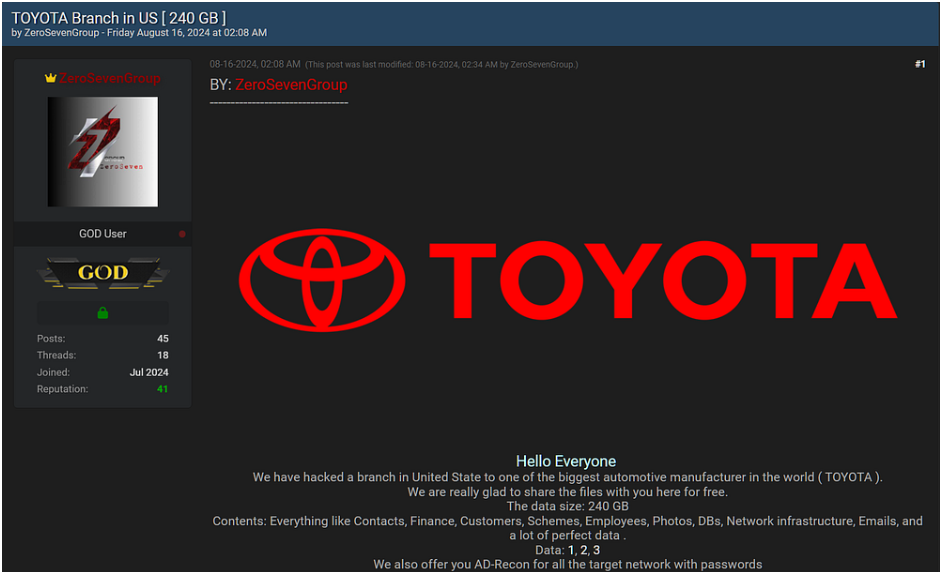
In a world where data is a prized asset, safeguarding it has become a critical priority for businesses and consumers alike. Recently, Toyota, one of the world’s leading automotive manufacturers, confirmed a significant data breach involving a third-party service provider. This breach has raised concerns about the security of customer data and has highlighted the ongoing challenges companies face in managing third-party risks. In this blog, we’ll explore the key details of the breach, its implications, and the lessons that businesses can learn to protect themselves and their customers.
Toyota disclosed that a data breach occurred due to a vulnerability in one of its third-party service providers. While the company has not yet revealed the exact number of affected customers, it has acknowledged that personal information may have been compromised. This information potentially includes names, addresses, phone numbers, and possibly payment details.
The breach highlights the critical issue of third-party risk in today’s interconnected business environment. Even companies with robust internal security measures can be vulnerable if their third-party partners lack the same level of protection.
In response to the breach, Toyota released an official statement addressing the situation:
“We deeply regret to inform our valued customers of a recent data breach that occurred through a third-party service provider. We are working diligently to investigate the full scope of the breach and are taking immediate steps to secure our systems and protect your information. Our priority is to ensure the safety and privacy of our customers, and we are committed to transparency as we navigate this incident.”
In a concerning development, a hacker group known as ZeroSevenGroup has reportedly taken responsibility for a significant data breach involving Toyota. According to a report by Bleeping Computer, the group claimed to have breached a U.S. branch of the automotive giant, exfiltrating a staggering 240GB of sensitive data. This cache of information includes critical details about Toyota employees, customers, financial contracts, and network infrastructure.
The attackers revealed that they leveraged the open-source tool ADRecon to gain detailed insights into Toyota’s Active Directory environments. ADRecon is typically used by security professionals for auditing, but in this instance, it was weaponized to extract vast amounts of network data, including valuable credentials. The stolen data, as described by ZeroSevenGroup, encompasses a wide array of sensitive content: contact lists, financial records, employee details, photos, databases, network infrastructure blueprints, emails, and more.
In a bold statement to Bleeping Computer, the hackers proclaimed their success, stating,
“We have hacked a branch in the United States of one of the biggest automotive manufacturers in the world (TOYOTA). We are really glad to share the files with you here for free.”
They went on to detail the contents of the breach, highlighting the comprehensive nature of the stolen data.
Intriguingly, the report suggests that the files may have been stolen or created as far back as December 2022. This timeline indicates that the attackers may have gained access to a backup server where Toyota’s data was stored, allowing them to pilfer a significant amount of information undetected for an extended period.

In December of last year, Toyota Financial Services (TFS), a subsidiary of Toyota, alerted its customers to a serious data breach. This breach, caused by a Medusa ransomware attack, compromised sensitive personal and financial data, affecting the automaker’s operations across Europe and Africa. The incident marked another significant security setback for Toyota, coming in the wake of previous breaches that highlighted vulnerabilities within the company’s data protection strategies.
Earlier in the year, in May, Toyota disclosed a separate breach involving the exposure of car-location data for approximately 2.15 million customers. This incident, which lasted from November 6, 2013, to April 17, 2023, was attributed to a misconfiguration in the company’s cloud database. Shortly after this revelation, further investigations uncovered two additional misconfigured cloud services that had been leaking Toyota customers’ personal information for over seven years.
In response to these breaches, Toyota has taken proactive measures to enhance its security posture. The company has introduced an automated monitoring system designed to oversee cloud configurations and database settings across all its environments, aiming to prevent future incidents.
Additionally, Toyota’s security challenges are not limited to recent events. In 2019, multiple Toyota and Lexus sales subsidiaries experienced a breach in which attackers accessed and leaked up to 3.1 million items of customer information. These repeated security lapses underscore the ongoing need for robust and vigilant data protection practices.
Overall, Toyota’s recent history of data breaches reflects a critical need for continuous improvement in cybersecurity measures to safeguard sensitive customer information and maintain trust.
Stay tuned for more insights and tips in our Cyber Security World with CyberFrat
Notifications